Black Country Pop Pioneers
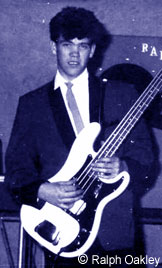
"From that moment of being engulfed in appreciative applause, I was hooked. This is what I wanted to do!"
Local author, Ralph Oakley, was generous enough to contact local music historian Brian W. Nicholls, following the posting recently on the BrumBeat site of 'The Montanas' bio, and offer his reminiscences on his formative years as a local musician between 1959 and 1966, as a member of Black Country pop groups The Marauders, The Strangers, The Cyclones, The Montanas and Finders Keepers.
As we shall hear, The Cyclones were an extremely busy group, listing TV appearances amongst their heavy schedule of events - notably from the ATV studios in Birmingham for the popular 'For Teenagers Only' show and a heavy commitment on the local ballroom circuit sharing billing with British and American stars. A significant factor of their popularity was having a female vocalist. Ralph joined The Cyclones in 1960 ostensibly as a two week stand-in but remained with them for three years.
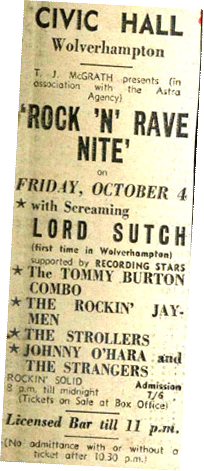
Upon initialIy meeting Ralph he appeared dismissive about his contribution to the burgeoning local music scene in and around the Black Country during the mid to late 1950s and also my attribution of the word 'pioneer' to those of that vintage. Ralph: "The band (The Marauders) itself was not particularly significant - it was a 'nursery band' for several other significant bands in the area".
Nevertheless, The Marauders (and Finders Keepers) were a 'wellspring' for the emergence of local talent such as Decca recording artistes 'The Strangers', Pye recording artistes 'The Montanas', Phillips recording artistes 'Finders Keepers' and CBS/Decca/Fontana recording artistes 'The Californians' plus, at least two famous names such as Mel Galley (Trapeze and Whitesnake) and Glenn Hughes (Trapeze/Black Sabbath/Deep Purple/Black Country Communion). All these, in some shape or form, are able to trace their lineage back to The Marauders from Coseley and Finders Keepers from Dudley. In fact, Galley and Hughes were both members of Finders Keepers at one time!
Ralph: "I was just nine years old when I made my first public appearance at a Coseley Scouts Club concert singing Frankie Laine's Sixteen Tons. From that moment of being engulfed in appreciative applause, I was hooked. This is what I wanted to do!"
"I was lucky, because at the time kids were struggling to 'make do' by attaching microphones to their acoustic guitars with Sellotape"
"My first electric guitar was a Hofner Club 50 semi-acoustic along with a Watkins Dominator 17 watt combination amp and speakers (all in one). I was lucky, because at the time, thousands of kids were struggling to 'make do' by attaching microphones to their acoustic guitars with Sellotape and then plugging them into small entry level (5-7 watt) amps as used by radio enthusiasts (Hams) and linked to separate speakers. Just recalling this set-up makes me shudder at the squeals of microphone fields colliding with speaker fields resulting in horrendous feedback".
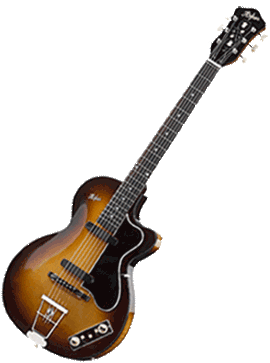
"I was certainly experimenting with rock bands/small guitar-based wannabees from 1955 onwards, at one time, even standing next to Mick (Kelly) Grocutt (later of E.L.O.) in an early Coseley rock effort which hadn't even got a name. The 'key' at the time was the necessity to jump from acoustic sound (skiffle) to amplified output. I lived in Ivy House Lane, Coseley, at the top of which was the premises of ('born before his time') Renee Greenshill - a brilliant electronics engineer, who made 30 watt (per channel) valve amplifiers, and cabinets to house the speakers."
"Always outside Renee's house (or so it seemed) was a gathering of impatient musicians waiting for delivery of their promised, custom made amplifiers. Mr Greenshill could be relied on for two things without doubt; wonderful quality equipment - always delivered late! My father was keen to support me in my quest to join in with the movement to electric music, and purchased good quality equipment for me, on the basis that when I was earning from it, I would repay him for it. My equipment came from 'The Band Box' in Snow Hill, Wolverhampton - opposite the Catholic church. The Band Box was hallowed ground for me and had a smell of new musical instruments which I can still remember to this day" (I know what you mean Ralph!).
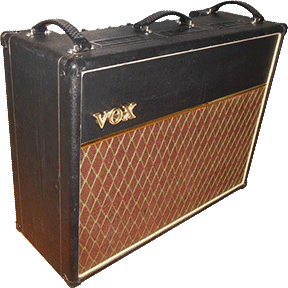
"From around 1960/61, the UK experienced a surge of commercially available amplifiers such as VOX AC 30 (as used by The Shadows, The Beatles and to become the 'industry standard' for all pro and semi-pro groups across the nation). Additionally, we had Fender amps from the USA and Selmer from Germany but the latter, whilst a worthy competitor, could not really compete with the celebrity endorsed UK and USA offerings."
At the time, American professional spec guitars were almost impossible to get hold of but, the photo of Ralph shows him holding a much coveted American-made Fender Precision bass - the weapon of choice for all serious pro bass players including Jet Harris of The Shadows. Notably, Ralph lays claim to have had the very first white precision bass in the UK which was on display at Jones & Crossland's Music shop in Birmingham.
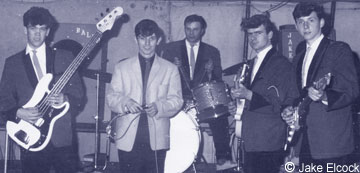
Ralph: "The Marauders approached me in 1959. They had been formed around 1956 and their line-up altered over time - as all groups did! The original line-up at the time was; Edward "Eddie" Cooke (lead guitar), Jake Elcock (guitar), Norman Withers (bass guitar), Arthur Tighe (lead singer), and Mick Aston (drums). The original Marauders had followed what had become the traditional line-up of a vocalist/front man (or very occasionally woman!) plus, two guitars, bass and drums, colloquially known as 'him and them' groups."
The only remaining photo of Ralph's Marauders shows the 1959 line-up as (left to right) Ralph Oakley, Roy 'Dripper' Kent, Mick Aston, Tony Dalloway and Jake Elcock. Such a line-up would typically follow the 'Cliff Richard and The Shadows' model. Now let's not lose perspective at this point because before they morphed into 'all round family entertainers' with musicals such as The Young Ones, Summer Holiday, and the Alladin pantomime season, Cliff and The Shads were a serious rock 'n' roll act that could (and still can, when they put their minds to it) rival anything that America can throw at us.
"We had to copy the chart hits for the punters 'note for note' or they would vote with their feet. We were a 'live' jukebox at every gig"
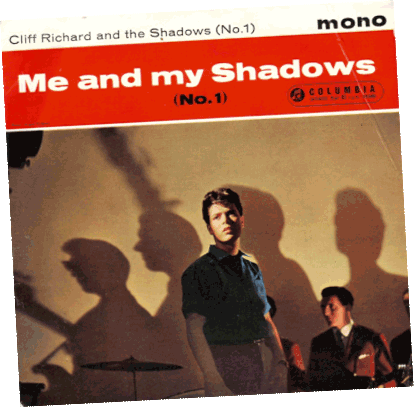
Ralph: "Since most groups were doing cover versions of UK and USA chart hits, there was no real discernable sound amongst the local Black Country groups. We had to copy the chart hits for the punters 'note for note' or they would vote with their feet. We were, effectively, a 'live' jukebox at every gig. Trying to 'plug' your own songs just didn't wash with the punters. They just sat that one out until you reverted back to the chart (hit parade as it was then known) covers. For me though, the first eight bars of 'Apache' by The Shadows and the intro to 'Move It' by Cliff Richard seduced me to follow the dream".
"The Marauders changed personnel and swopped around frequently following me joining them in the summer of 1959. I lasted a year before making a mess of my school O-Level exams and, as a condition of being allowed to retake them, I had to quit rock music - well, for the time being anyway!" Ralph's next group was called The Strangers.
Ralph: "After I left, the remaining Marauders - Jake, Mick and Tony joined forces with Alan 'Cleebo' Clee on lead guitar which meant Jake swopping to bass and also the introduction of John O'Hara on lead vocals. This line up continued until 1963. The very first incarnation of The Strangers (formed c 1959/60) included Alan 'Cleebo' Clee (lead guitar), Jeff Crew (vocals), Graham Crew (drums), Frankie Byrne (rhythm guitar) and Ken 'Snakey' Warr (bass)". Around 1960/61 though, Marauders' Jake Elcock and vocalist Roy 'Dripper' Kent joined forces with Mick Aston and Tony Dalloway adopted the name Strangers as the original line up had split up. In fact, it was actually an amalgamation of two disbanding groups as was the norm in those days".

Lead guitarist Alan Clee of the existing Strangers negotiated with the remaining Marauders a new musical direction with lead guitarist (Marauders) Jake Elcock switching to bass, Tony Dalloway played rhythm guitar, Nick Aston played drums, John O'Hara on lead vocals replacing Dripper Kent who had enrolled at teacher training college. The group also had Jackie Thornton from Tividale group, The Teenbeats, as a vocalist for a short while.
The Strangers remained in this incarnation until 1965 when Dripper Kent reappeared on the scene and replaced John O'Hara on lead vocals. Ralph, who had in the meantime formed The Montanas left them at the same time and joined The Strangers who, after a brief spell as The Martells, then collectively became, Finders Keepers. (talk about recycling!).
We were soon joined in this interview by one-time female vocalist with The Cyclones - Kate Mulraney. Kate was part of a rare breed of female vocalists at the time - pop groups being a rather, (almost exclusive), male dominated world. Kate was, and still is a jazz singer at heart with a voice to match her aspiration. This was realised when she ultimately left The Cyclones and joined The Tony Richards Trio. However, she burst on the music scene after winning £25 (a lot of money in 1959!) in a singing competition at the age of fifteen after which, she was approached by a number of local groups of which she chose to become a Cyclone.
Kate: "The work was prolific. We literally did not have a night off so we had to rehearse on Sunday mornings. In my day job, I was earning £8.16/ a week but with The Cyclones, I was making that in a couple of nights! We worked exclusively for what was known as The Mary 'Ma' Regan ballroom circuit; The Plaza - Old Hill, The Plaza - Handsworth, The Ritz, Kings Heath and The Brum Kavern Club. We shared the bill at each of the ballrooms with all the household names from Britain and America."
"Playing at three of the Regan ballrooms in one night was the norm. I've known us work four gigs in one night"
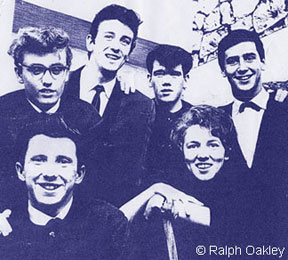
"Playing at three of the Regan ballrooms in one night was the norm. When Ma Regan was short of a group for whatever reason, I've known us work four of the gigs in one night. Remember, there were no such luxuries as roadies in those days so we had to lug all the gear about ourselves. Although I say exclusively for the Regan ballroom circuit, we did actually play two other gigs from time to time namely, Tipton Social Club and The Black Horse, Wolverhampton.
"I was told I had 'a voice' so I believed it! I was not a pop star at heart - much preferring Ella Fitzgerald, Peggy Lee, Billie Davis and Frank Sinatra - although I did rate Cilla Black, and Anyone Who Had A Heart was my showcase number. Although I say it myself, our rendition of that song literally brought the house down!". Kate Mulraney eventually joined The Bev Pegg Group and has featured on two of their albums.
Certain 'Regan' groups such as The Redcaps and The Modernaires used to accompany many of the famous names because Musicians Union rules meant that unless an equivalent British group went to America in exchange, then the artist could not bring their own backing groups over. It was called a 'Counterparting Agreement'. The same thing happened when 'Cliff Richard and The Shadows' went to America. The Shads weren't allowed to perform because of the exchange agreement so they had to sit and watch whilst local musicians did 'The Shadow's walk!'
Typical case in point was Gene Vincent (and The Bluecaps). The chosen group were given the repertoire, the chord charts and the records and allowed, at best, a day to learn the set. Ralph Oakley and his bandmates actually met Gene Vincent on one New Year's Eve occasion where he cracked open a bottle of Johnny Walker Black Label after the show and, says Ralph; "We shared quite a few large tots with him and, as a consequence, I got absolutely wasted!"
The Cyclones also had a male singer (Roy Denson) who did a tidy job of impersonating Elvis Presley and Billy Fury. However, he was first and foremost a frontman (like his heroes) and tended to see the group as an adjunct to his vocal prowess. This was not an isolated case, it was the nature of the business where groups comprised of 'him and them' lineups. Enter then in 1962, on the crest of the 'beat boom', the self-contained group who wrote, sang, and played their songs without a discernable frontman - Ladies and Gentlemen, I give you The Beatles!
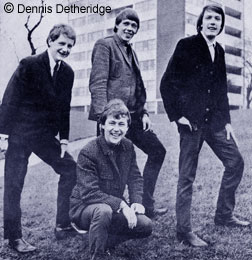
In January of 1964, just after leaving The Cyclones, Ralph Oakley formed The Montanas who developed into the most successful Wolverhampton group of the 1960s. The Montanas comprised of Ralph (bass/vocals), Bill Hayward (lead guitar) from The Crossfires and The Belmonts, Graham Crew (drums) ex Strangers, Johnny Jones (vocals) no previous groups, and Alan Wooldridge (rhythm guitar) no previous groups.
Ralph recruited vocalist Johnny Jones after seeing him get up with The Strangers for a few numbers at the Dudley Liberal Club. Their first gig was at Whitmore Reans WMC (Working Men's Club). Ralph quit The Montanas around Christmas 1964 as he did not like the direction in which the group appeared to be going and was replaced by Terry Rowley from The Mountain Kings.
Interestingly, Ralph Oakley, Jake Elcock, Dripper Kent, and Johnny Jones were all ex-Dudley Grammar School pupils as was Tony Dalloway. The school appears to be a source of local musical talent at the time. Ralph was equally comfortable playing guitar or bass as well as singing vocal harmony.
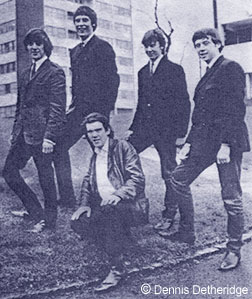
Finders Keepers were from the onset, a fully professional outfit when Ralph joined for their inaugural gig at the famous Cleveland Arms, in Willenhall in the summer of 1965. The line up of Finders Keepers at this point was, Ralph Oakley (rhythm guitar/vocals), Roy "Dripper" Kent (vocals), Jake Elcock (bass/vocals), Alan "Cleebo" Clee (lead guitar) and Dave Williams (drums). A strong feature of this line up was the three-part vocal harmonies of Ralph, Jake and Dripper which made covering of big vocal songs a breeze. Ralph left Finders Keepers in 1966 immediately after returning from a stint in Germany with the group then continuing on as a four piece.
If we look at the lineage I mentioned at the start of this article it is worth noting the following career paths followed when people left Finders Keepers. Alan Clee joined The Blue Jays (ex Moody Blues members) and then Wombourn folk group 'Giggetty'. He still lead Finders Keepers right up until their final Christmas Concert at Brierley Hill Civic Hall in December, 2009 after which, they finally disbanded. Jake Elcock (left 1967) for a prolific touring and TV/radio and recording career with The Montanas. Dripper Kent (left 1969) to form Light Fantastic. His son Pete Kent carries on the family musical mantle as a virtuoso guitarist who very recently headlined at The Robin2 in Brierley Hill.
Mel Galley went on to form Trapeze and then joined Whitesnake. Glenn Hughes Left to form Trapeze and then joined Deep Purple and then Black Sabbath and is now currently touring with 'Black Country Communion' to promote their latest CD. Dave Holland Left to form Trapeze and then joined Judas Priest. John O'Hara (Strangers) eventually joined The Californians. Ian 'Sludge' Lees Joined The Montanas and later went on to become a successful comedian and is still treading the boards in this capacity and still... "mekkin 'um loff".
As for Ralph Oakley - in his time, he has written a handful of beautiful songs - he is now a successful author. His recent book 'Children of The Gorge' (a vivid fictional account of children living in the Ironbridge area during the industrial revolution) has already sold 25,000 copies locally!
Indeed, a veritable legacy spawned by Coseley, Dudley and Wolverhampton lads (and a lass!) who's initial ambition was to just enjoy the music, entertain people, and have fun!
Copyright © Brian Nicholls 2011
Local music historian Brian Nicholls played guitar in several West Midlands groups during the 1960s including Varsity Rag. He is a regular contributor to the BrumBeat web site.